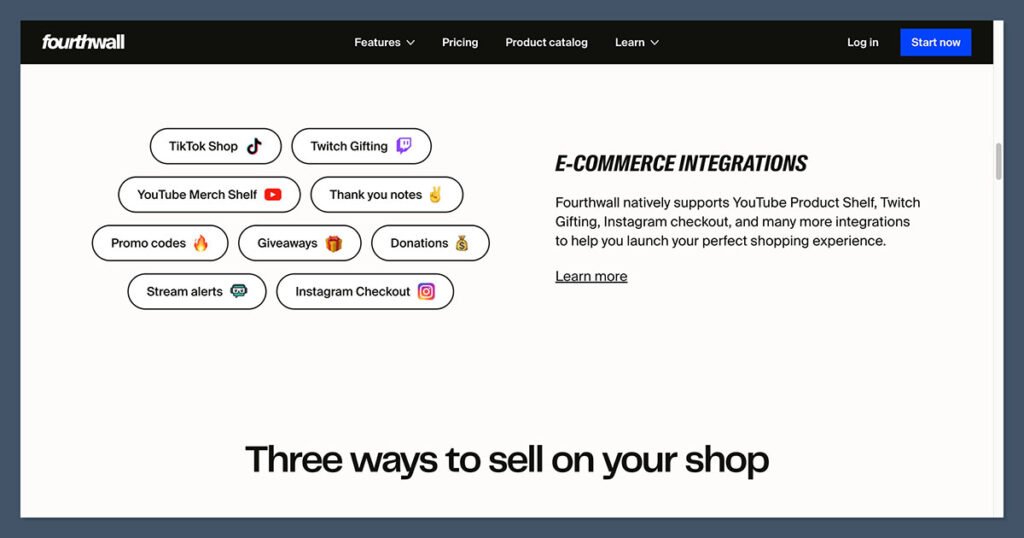I’ve spent the last 10 years testing eCommerce platforms, building stores, and helping people grow their online businesses. Shopify has been my go-to platform for years, but when Fourthwall came onto the scene, I had to test it out.
Both platforms let you sell products online, but they’re built for very different types of sellers.
Shopify is the industry leader for eCommerce businesses, while Fourthwall is designed specifically for content creators who want to monetize their audience with merch, memberships, and paywalled content.
So which one is better? It depends on what you’re selling and how you want to grow your business.
I’ve broken down everything you need to know—pricing, features, ease of use, integrations, SEO, and more.
Let’s dive in.
Pricing: Shopify vs Fourthwall—Which One Costs More?
Pricing is one of the biggest differences between these two platforms.
Shopify Pricing
Shopify uses a subscription-based pricing model, meaning you pay a monthly fee:
| Plan | Cost (Billed Annually) | Transaction Fees (If Not Using Shopify Payments) |
|---|---|---|
| Basic | $39/month | 2.0% |
| Shopify | $105/month | 1.0% |
| Advanced | $399/month | 0.5% |
| Shopify Plus | Custom | Custom |
- Shopify also charges a credit card processing fee (starting at 2.9% + 30¢ per transaction).
- If you use third-party payment gateways, Shopify takes an extra cut (unless you use Shopify Payments).
- Most businesses will also need apps, which can add $20–$100+ per month.
Shopify's pricing structure is designed to scale with your business. While the monthly fees can add up, the benefit is that as your sales increase, your costs decrease in proportion to revenue.
For example, Shopify Plus—designed for enterprise-level businesses—offers negotiable pricing that can significantly reduce transaction fees.
This is a major advantage for high-volume sellers who process hundreds of thousands in sales each month.
Another hidden cost to consider with Shopify is premium themes and third-party apps. While Shopify offers free themes, the best-looking and most functional ones can cost between $180 and $350 as a one-time fee.
On top of that, apps for abandoned cart recovery, upsells, and email marketing often come with monthly fees, which can quickly add up.
This means that while the base cost of Shopify may seem reasonable, a fully functional store can easily cost $100–$300/month or more.
Fourthwall Pricing
Fourthwall doesn’t charge a monthly fee—instead, they take a percentage of each sale:
| Revenue Bracket | Fee Per Sale |
|---|---|
| First $5,000 | 5% |
| $5,000 – $100,000 | 4% |
| $100,000+ | 3% |
That means you only pay when you make money.
- There are no additional app costs (since most features are built in).
- Payment processing fees still apply (around 2.9% + 30¢ per sale, just like Shopify).
The biggest advantage of Fourthwall's pricing is that there are no upfront costs. This makes it perfect for new sellers who don’t want to risk paying a monthly subscription fee before making sales.
This is particularly attractive to content creators, who may not have consistent product sales but want a store ready when needed.
However, as your sales grow, the percentage-based fee can become more expensive than Shopify's flat-rate plans.
If you're processing $10,000+ in sales per month, Fourthwall’s 4% cut could add up to $400 per month, which is more than Shopify’s $105/month plan (with lower transaction fees).
At high volumes, Shopify becomes the more cost-effective choice.
Which One’s Cheaper?
- For small sellers, Fourthwall is better since you don’t have to pay upfront.
- For high-volume sellers, Shopify is cheaper because its fees shrink as you scale.
Ease of Use: Which Platform Is Simpler?
Shopify: More Powerful, But More to Learn

- Setting up a store takes time, but you can customize everything.
- Shopify’s dashboard is feature-packed, which means a slight learning curve.
- Customizing themes requires some coding knowledge (unless you hire a developer).
While Shopify's setup process is straightforward, it does require more steps compared to Fourthwall. You'll need to choose a theme, set up payment processors, configure shipping settings, and install apps depending on your needs.
Shopify does provide a step-by-step onboarding guide, but it can still take a few hours to fully configure your store.
Shopify’s customization flexibility comes with a learning curve. If you want to modify your store’s design beyond the basics, you might need to edit Liquid code (Shopify’s templating language).
This is where many sellers end up hiring developers, which can add extra costs to their budget.
Fourthwall: Zero Learning Curve

- Easiest setup process I’ve tested—takes 5 minutes to launch a store.
- Everything is pre-integrated (no need for external apps).
- Great for creators who don’t want to mess with technical settings.
Fourthwall's biggest strength is simplicity. You don't have to worry about choosing a theme, installing apps, or setting up a payment processor—everything is built into the platform.
This makes it an excellent choice for content creators who just want to start selling without spending hours on setup.
Since Fourthwall is pre-integrated with print-on-demand and digital products, it eliminates the need for third-party services like Printful or Teespring.
This is a huge time-saver for creators who want to sell merch without managing logistics.
Which One’s Easier?
- For serious businesses, Shopify gives more control but requires more setup.
- For quick selling, Fourthwall is hands down the easiest option.
Features & Customization: What Can You Do?
Shopify: The Most Customizable eCommerce Platform
✅ Sell physical, digital, and subscription products
✅ Thousands of themes (free & paid)
✅ Advanced inventory management (multi-location, bulk editing)
✅ Huge app store (for marketing, upsells, automation)
🚨 Downside: Many features require paid apps, increasing costs.
One of Shopify's biggest advantages is its ability to scale with any business type. Whether you’re selling handmade products, dropshipping, or running a global brand, Shopify provides the tools to support your growth.
This includes B2B selling, multi-store management, and even international expansion tools like multi-currency support.
Since Shopify has a massive app ecosystem, you can add nearly any feature you need. However, this also means that many critical features—like advanced email marketing, upsells, and one-click checkouts—are locked behind paid apps.
This can make Shopify expensive for sellers who need additional functionality.
Fourthwall: Simple, But Feature-Limited
✅ Built-in print-on-demand (no external suppliers needed)
✅ Sell merch, memberships, and digital content
✅ No need for apps—most tools are included
🚨 Downside: No third-party app store, so you’re limited to built-in tools.
Fourthwall is perfect for creators because it’s designed to make selling as easy as possible. Instead of forcing you to find separate print-on-demand providers, integrate payment processors, or install marketing tools, everything is already included.
This makes it one of the simplest ways to sell merch or digital content without worrying about logistics.
One major limitation is that Fourthwall lacks a full-fledged app store like Shopify. While this means you don’t have to worry about extra app costs, it also means that if Fourthwall doesn’t offer a specific feature, you’re out of luck.
This can be a problem for sellers who want advanced automation, custom email sequences, or detailed analytics.
Who Wins?
- Shopify is better for businesses that need scalability and flexibility.
- Fourthwall is better for creators who just need a simple way to monetize.
Integrations: What Can You Connect?
Shopify: The Integration Powerhouse
✅ 8,000+ third-party apps (Klaviyo, Printful, Zapier, etc.)
✅ Dropshipping & print-on-demand support
✅ 100+ payment gateways (Shopify Payments, PayPal, Stripe)
Shopify’s biggest strength is its massive app store and integrations. If you need a specific feature—whether it’s email automation, conversion rate optimization, or advanced analytics—there’s an app for that.

This allows sellers to customize their store completely and scale their business as needed.
Another huge advantage is multi-channel selling. Shopify integrates seamlessly with Facebook, Instagram, TikTok, eBay, Amazon, and Walmart, making it easy to expand your brand across multiple platforms.
This is a game-changer for businesses looking to maximize reach.
Fourthwall: Pre-Integrated But Limited
✅ No need for apps (everything is pre-built)
✅ Stripe for payments (no PayPal yet)
Fourthwall simplifies selling by removing the need for third-party apps. Since it already includes print-on-demand, digital downloads, and membership tools, you don’t need to worry about finding external services.
This is great for creators who want an all-in-one solution without extra costs.

However, this also means you’re limited to the features Fourthwall provides. If you need a specific email marketing tool, advanced automation, or additional payment gateways, you may find yourself restricted.
For example, PayPal isn’t supported yet, which can be a dealbreaker for some buyers.
Who Wins?
- For advanced integrations, Shopify dominates.
- For a plug-and-play experience, Fourthwall is simpler.
SEO & Marketing: Which One Helps You Rank & Sell?
Shopify: Built for Growth
✅ Custom URLs, metadata, and alt text
✅ Fast page speed (on optimized themes)
✅ SEO-friendly blogging tools
🚨 Downside: Some themes slow down page speed
Shopify is one of the best eCommerce platforms for SEO. It allows you to fully control your site structure, metadata, and content, which is crucial for ranking on Google.
Shopify also includes built-in blogging tools, making it easy to create content that drives organic traffic.
One issue with Shopify is that some themes rely heavily on JavaScript, which can slow down your store. However, this can be fixed by choosing a lightweight theme and optimizing your images.
If SEO is a major focus, Shopify gives you way more tools and flexibility than Fourthwall.
Fourthwall: Basic, But Effective for Creators
✅ Basic metadata & page optimization
✅ Fast loading speeds (lightweight code)
🚨 Downside: Less control over advanced SEO settings
Fourthwall is not designed for hardcore SEO strategies, but it does include the basics. You can edit page titles, descriptions, and URLs, and the platform is built to load quickly—which is great for user experience.
However, you can’t install third-party SEO apps, and you don’t get advanced customization options like schema markup or XML sitemaps.
Since most Fourthwall users rely on social media traffic rather than Google search, SEO isn’t a huge focus for the platform. If your sales come from TikTok, YouTube, or Instagram, this might not be a dealbreaker.
But if you want to build a long-term SEO strategy, Shopify is the better choice.
Who Wins?
- Shopify is better for long-term SEO growth.
- Fourthwall is fine for creators who rely on social media traffic.
Support: Who Has Better Customer Service?
| Feature | Shopify | Fourthwall |
|---|---|---|
| 24/7 Live Chat | ✅ Yes | ❌ No |
| Phone Support | ❌ No | ❌ No |
| Email Support | ✅ Yes | ✅ Yes |
| Community Forum | ✅ Yes | ❌ No |
Shopify: Reliable, But Generic
Shopify offers 24/7 live chat and email support, but response times can be slow during peak hours. They also have a massive help center, community forums, and video tutorials, making it easy to find answers on your own.
The biggest downside? Shopify’s support is very general—they help with technical issues but won’t guide you through advanced strategies.
If you need help with marketing, SEO, or conversion optimization, you’ll need to hire an expert or join a paid Shopify coaching group.
Fourthwall: Small, but Personalized
Fourthwall doesn’t have live chat support, but their email team is fast and helpful. Since they work with a smaller user base, their support feels more personalized compared to Shopify’s.
One major downside is the lack of community resources. Since Fourthwall is a newer platform, there aren’t many tutorials, case studies, or expert guides available online.
If you run into an issue, you’ll likely have to wait for email support rather than finding an instant answer.
Who Wins?
Shopify has better overall support, but Fourthwall’s team is more personalized.
Who Should Use Which?
Shopify is best for:
- Business owners who want full control
- People who need scalability
- Sellers who rely on SEO & ads
Fourthwall is best for:
- Creators selling merch, memberships, or digital content
- Beginners who don’t want to deal with tech
- Anyone who wants an all-in-one solution
Final Verdict: Which One Should You Choose?
If you’re a content creator looking for a quick and easy way to sell merch, memberships, or digital content, Fourthwall is a great option.
It’s simple to use, has no monthly fees, and comes with built-in tools to handle everything for you. However, it lacks advanced customization and integrations, which can limit your ability to scale.
On the other hand, Shopify is the better choice for anyone who wants full control over their store and long-term growth.
It offers more flexibility, better SEO tools, and a huge ecosystem of apps to help you scale. While it does come with monthly costs and additional fees, it provides the tools needed to build a serious eCommerce business.
If you just need a simple way to monetize your audience, go with Fourthwall. But if you want a fully customizable, scalable online store, Shopify is the better investment.




Comments 0 Responses